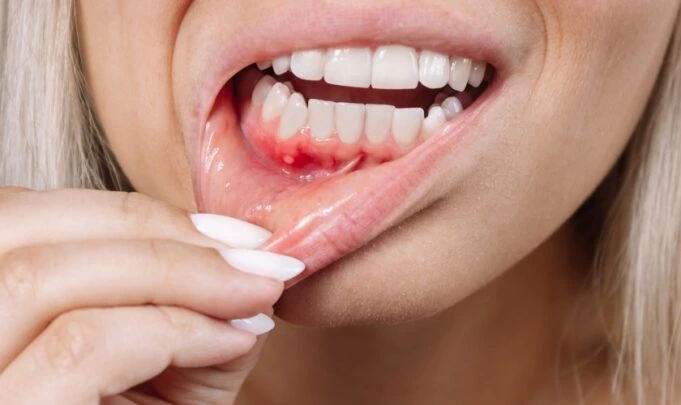Introduction
Stress is an inevitable part of modern life that affects both mental and physical health. While its role in contributing to conditions like heart disease, hypertension, and anxiety is well-documented, many people fail to realize that stress can also have a significant impact on oral health. One such consequence is the development and progression of periodontal disease—a condition that affects the gums and supporting structures of the teeth. Research has shown that chronic stress can increase the risk of gum disease, complicating the body’s ability to maintain healthy gums and teeth.

What Is Periodontal Disease?
Periodontal disease is a chronic inflammatory condition that begins with gingivitis and can progress to periodontitis if left untreated. Gingivitis is the earliest stage of gum disease and is characterized by red, swollen gums that may bleed when brushing or flossing. If the condition is not addressed, gingivitis can escalate to periodontitis, a more severe stage of gum disease that leads to gum recession, bone loss, and, eventually, tooth loss. According to the Centers for Disease Control and Prevention (CDC), nearly 47% of adults aged 30 and older suffer from some form of periodontal disease, making it a major public health concern.
How Stress Affects Oral Health and Periodontal Disease
The relationship between stress and periodontal disease is multifaceted. Stress affects the body’s immune response, inflammatory processes, and behaviors—all of which can contribute to the development of gum disease.
Immune System Suppression
Chronic stress weakens the immune system, making it harder for the body to fight off infections, including those in the mouth. This compromised immune response allows harmful bacteria to thrive in the gums, leading to inflammation and infection. Research has shown that individuals experiencing high levels of stress have a higher risk of developing severe periodontitis, as stress impairs the body’s ability to control bacterial growth in the mouth.
Increased Cortisol Levels
Another key factor linking stress to periodontal disease is the production of cortisol, a hormone released in response to stress. Elevated cortisol levels can trigger widespread inflammation throughout the body, including in the gums. Chronic inflammation in the gum tissue accelerates the progression of gum disease and increases the risk of severe periodontal issues.
Stress-Related Behaviors That Contribute to Gum Disease
Beyond its direct physiological effects, stress often leads to behaviors that can worsen oral health, further increasing the risk of periodontal disease.
1. Neglecting Oral Hygiene
High stress levels can lead to neglecting daily oral hygiene routines. Skipping brushing and flossing allows plaque and tartar to accumulate on the teeth, contributing to gum disease.
2. Teeth Grinding and Clenching
Stress often causes individuals to grind or clench their teeth, especially during sleep. This habit, known as bruxism, can cause damage to tooth enamel, gum tissue, and even lead to gum recession. Over time, this can contribute to the development of periodontal disease.
3. Unhealthy Eating Habits
When stressed, many people turn to comfort foods, often rich in sugar and processed ingredients. These types of foods can lead to plaque buildup on teeth and promote the growth of harmful bacteria in the mouth, both of which are risk factors for gum disease.
4. Increased Smoking and Alcohol Consumption
Stress also encourages behaviors such as smoking and excessive alcohol consumption, both of which are known to exacerbate periodontal disease. Smoking impairs gum tissue healing, while alcohol can reduce saliva production, increasing the risk of dry mouth and bacterial growth.
Scientific Evidence Linking Stress to Periodontal Disease
Several studies have confirmed the connection between stress and gum disease. Research published in the Journal of Clinical Periodontology highlighted that individuals suffering from stress-related conditions such as anxiety and depression are at a significantly higher risk of developing periodontal disease.
In addition, studies suggest that stress can alter the oral microbiota, promoting the growth of bacteria that trigger gum inflammation and infection. Chronic stress also impairs wound healing, which means that any existing gum damage takes longer to recover, further contributing to the progression of periodontal disease.
How to Manage Stress to Protect Your Oral Health
Given the strong link between stress and periodontal disease, it’s essential to manage stress effectively in order to protect your oral health. Here are several strategies that can help reduce stress and prevent the development of gum disease:
1. Maintain Good Oral Hygiene
The foundation of good oral health begins with a consistent oral hygiene routine. Brush your teeth twice daily with fluoride toothpaste, floss regularly, and use an antimicrobial mouthwash to reduce plaque buildup and prevent gum disease.
2. Engage in Stress-Relieving Activities
Stress management is key to maintaining overall health, including oral health. Engaging in regular exercise, practicing meditation, and focusing on deep breathing exercises can help lower stress levels. Hobbies, socializing, and relaxation techniques are also valuable tools to combat stress.
3. Follow a Healthy Diet
A balanced diet rich in vitamins, minerals, and antioxidants can support gum health and reduce inflammation. Eating foods high in omega-3 fatty acids, such as fish and flaxseed, can also help regulate inflammatory responses in the body, protecting the gums from damage.
4. Seek Professional Help
If you are struggling to manage stress, consider seeking therapy or counseling. Professional support can provide you with tools and strategies to cope with anxiety, depression, and other stress-inducing factors, reducing their impact on your oral health and overall well-being.
5. Regular Dental Checkups
Routine visits to your dentist for professional cleanings and checkups are essential in preventing and detecting early signs of periodontal disease. Your dentist can help identify potential problems before they progress, offering treatments to protect your gums and teeth.

Conclusion
Stress is not just a mental health concern; it can also have a significant impact on oral health. By weakening the immune system, triggering inflammation, and promoting unhealthy habits, chronic stress plays a pivotal role in the development and progression of periodontal disease. Fortunately, by practicing good oral hygiene, engaging in stress-relieving activities, and seeking professional help, you can protect your gums and reduce your risk of gum disease. Prioritizing stress management not only benefits mental well-being but also plays a crucial role in maintaining a healthy smile and overall oral health.

